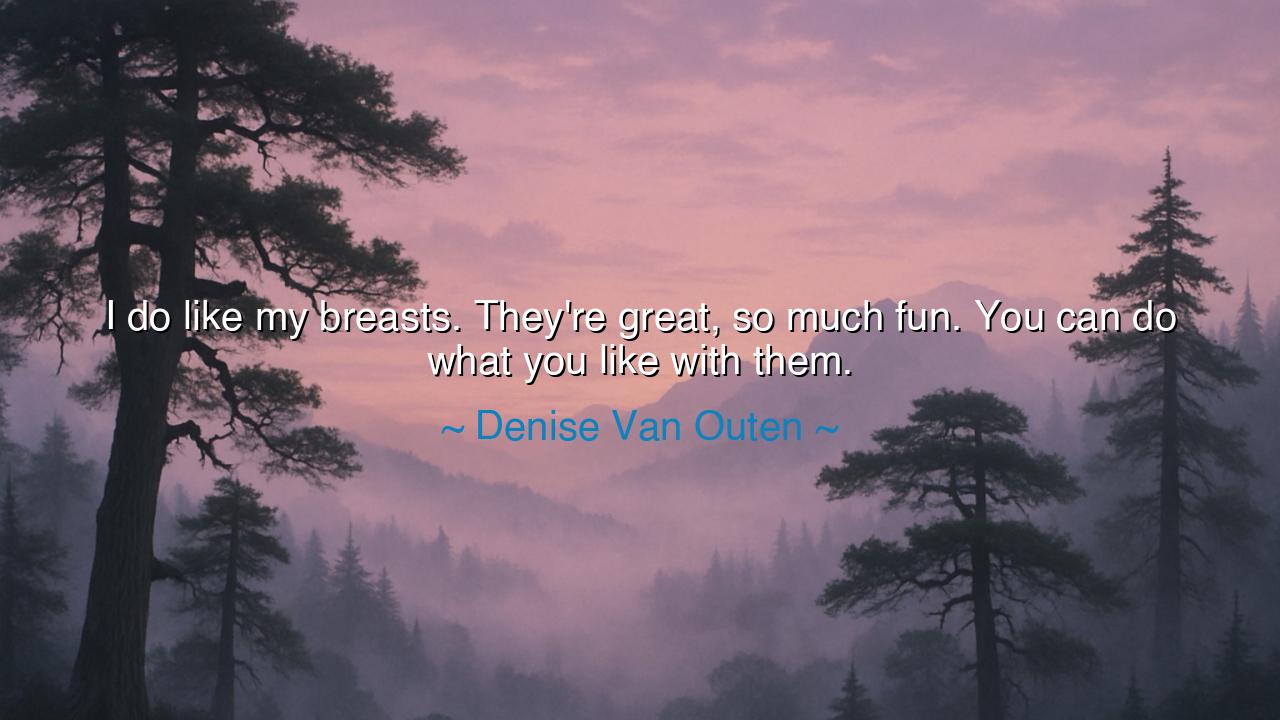
I do like my breasts. They're great, so much fun. You can do what






In the candid and playful words of Denise Van Outen, there lies a truth deeper than jest, a wisdom wrapped in humor and light: “I do like my breasts. They're great, so much fun. You can do what you like with them.” At first, it may seem a casual remark—a celebrity’s quip about beauty or confidence—but beneath its laughter, there is a profound declaration of self-acceptance, ownership, and the ancient right of every soul to rejoice in their own being. For to love one’s body, without shame or apology, is not vanity—it is reverence for the vessel through which life expresses itself.
The origin of this quote arises from Denise Van Outen’s openness about confidence and self-image in a world that often teaches women to hide their joy in their own form. As an actress, singer, and television personality, she lived within an industry that magnifies, critiques, and commodifies the human body. Yet, in this simple, cheerful statement, she reclaims what is hers—not as an object of judgment, but as a celebration of her own vitality. Her words are playful, but they strike at something ancient: the human need to honor the body as a part of the self, not as something separate or sinful.
The ancients, too, understood the sanctity of form. In the temples of Greece, the sculptors carved the human figure not with shame, but with awe. To them, the body was divine architecture—a reflection of the gods themselves. The goddess Aphrodite, born of sea foam, was not worshipped for modesty but for beauty without fear. Her image adorned shrines not as temptation, but as truth—that to embrace the body is to honor creation itself. Likewise, the words of Denise Van Outen echo across millennia as a modern hymn to that same divine confidence: to delight in one’s form, not in arrogance, but in gratitude.
Consider the story of Josephine Baker, the dancer and activist who, in the 1920s, captivated Paris with performances that were both sensual and revolutionary. She used her body as both art and statement, declaring through dance what others dared not say aloud—that joy in one’s own skin is power, and expression is freedom. Her body, often criticized by the puritanical and idolized by the liberated, became a living symbol of defiance against shame. Denise’s words, though simple, echo the same energy—the freedom to exist joyfully and fully in one’s own flesh, to laugh, to move, to live unbound by fear or judgment.
There is a sacredness to such laughter. When one says, “I like myself,” it is not an act of pride—it is a form of healing. For centuries, the world has taught especially women to shrink, to doubt, to cover themselves in apology. But when a woman, or any person, stands before the mirror and smiles—not with arrogance, but with peace—they honor life itself. The body is not a sin, but a song. To appreciate it is to thank the universe for the instrument through which we breathe, create, love, and dream.
And yet, this truth is not without challenge. The line between confidence and arrogance is one that must be walked with care. To love oneself rightly is not to worship the surface, but to celebrate the whole. The body is not the totality of the self, but neither is it separate from the soul—it is the sacred ground where spirit meets flesh. Denise’s humor reminds us that we must not treat the body as an enemy to discipline or an idol to adore, but as a companion to cherish. The ancients would say: “The wise do not despise the form, for they know it is the mirror of the divine.”
The lesson, then, is this: embrace your form, and do not apologize for being alive within it. Love your body—not because others approve, but because it is yours. Speak kindly to it, nourish it, adorn it if you wish, and forgive its imperfections. Laugh at it, as Denise does, for laughter too is a form of reverence. Whether your beauty is praised or dismissed, let it never be a measure of your worth, but a reflection of your joy in being.
So, my listener, take this teaching to heart: stand before the world not in shame, but in confidence born of gratitude. For every curve, every feature, every imperfection is a verse in the great poem of your existence. As Denise Van Outen so simply and powerfully reminds us—find delight in your own being. Celebrate yourself not as the world defines you, but as life itself made flesh. When you do so, you not only honor yourself—you honor the creative spirit that fashioned you. And that, in truth, is the most ancient and noble act of all.






AAdministratorAdministrator
Welcome, honored guests. Please leave a comment, we will respond soon